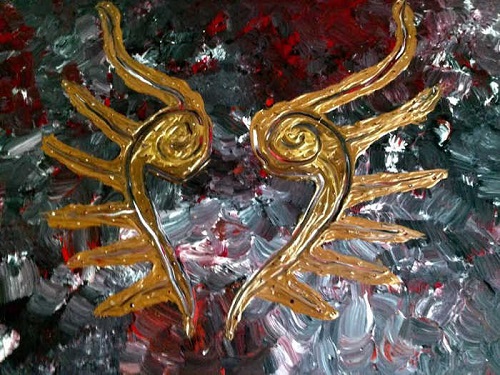FWP:
SETS
CHAK-E GAREBAN: {17,9}
CLOTHING/NAKEDNESS: {3,5}
MADNESS: {14,3}
The dawn is a long straight slash of bright glowing light on the horizon (thus 'the crack of dawn'; for more on this image, see {67,1}); the wound in the heart is a deep slash too. Thus they both have the shape of the traditional neck-opening of a kurta (a shape for which 'collar' is not an ideal word; 'placket' would be better, but it's too obscure). So if a semi-personified Madness, already naked, would still wish to rend its garments and rip its collar open, it will actually have more powerful, more radiant, more evocative material to rip. For the wound in the heart would act as a collar (literally, do 'collarness' [garebaanii]), by making itself available for further rending and tearing; thus Bekhud Mohani's exegesis.
Moreover, the wound in the heart would act as a collar 'like the dawn' [.sub;h ke maanind]. This phrase could be read in a general way: just as the long straight bright slash of dawn is quickly opened up by the hand of time to reveal broad daylight, so the wound in the heart will be quickly ripped open by Madness to reveal more radiant blood (and signal the death of the madman).
But more piquantly, it could also be taken quite literally: when naked Madness looks around for a 'collar' to rip, it finds two volunteers standing by: the wound in the heart, and the slash-line of dawn. Or rather, it finds the dawn first, for the wound does its collar-ing 'like the dawn'. There seems to be a non-temporal hierarchy though, since the line is really about the role of the wound, and the dawn enters the picture only in a casual simile. The dawn makes itself available too, but it's the wound that's really worth our attention.
Compare {62,8}, which also
likens the wound to the dawn-- to the disadvantage of the latter.

Nazm:
That is, in a state of nakedness if Madness/wildness would long to rip open the collar, then like the dawn, the wound of the heart too would become a collar and be ripped. (215)
== Nazm page 215